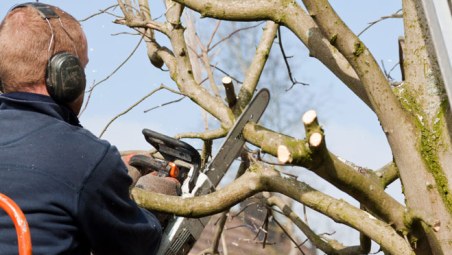 Court Declines to Cut Down Massachusetts Rule: Neighbor Not Liable for Damage Caused By Healthy Tree
Court Declines to Cut Down Massachusetts Rule: Neighbor Not Liable for Damage Caused By Healthy Tree
I hope everyone is having a fun and relaxing summer. While you were soaking up the rays down the Cape or enjoying a delicious lobster roll at Woodman’s in Essex, the justices of the Supreme Judicial Court remained busy deciding cases.
A few weeks ago, in Shiel v. Rowell, the Court was asked to overrule centuries-old common law that a landowner may not be held liable for damage caused to a neighbor’s property from a healthy tree. In an opinion interspersed with amusing tree puns, the justices declined to uproot precedent, and reaffirmed the “Massachusetts Rule” that if a healthy tree causes damage to a neighbor’s land, there is no liability. However, the neighbor may prune or remove encroaching branches or roots.
100 Foot Sugar Oak Tree
In the case, Keli-Jo and John Rowell own residential property adjacent to Mary Shiel. On the Rowells’ property sits a 100 foot tall sugar oak tree with branches reaching over Shiel’s property. Shiel filed a complaint with claims of private nuisance and trespass against the Rowells after the tree caused algae buildup on the roof of Shiel’s home and the Rowells refused to cut it down. Shiel sought money damages for the damage to her roof and an injunction demanding that the overhanging branches be cut back. A judge in Quincy District Court dismissed Shiel’s lawsuit, citing the Massachusetts Rule above.
No Reason To Overrule Legal Precedent
The case went up on appeal, with Shiel urging the SJC to adopt the “Hawaii Rule” which allows a neighbor to require the tree owner pay for damage and cut back branches and roots if the tree causes, or there is an imminent danger of it causing, harm to the neighbor’s property. Shiel reasoned that the Massachusetts rule is outdated because today people are living in closer proximity to one another on smaller tracts of land than they were back in the 1800’s. While the justices acknowledged the recent need for changing other aspects of premises liability (eliminating distinctions between licensees, visitors, trespassers, for example), they saw no drastic change in the Massachusetts landscape to overrule over a hundred years of legal precedent. The law on tree responsibility remains the same today as it was in 1890.
Same Law, Same Questions
Now, the question I get the most from homeowners is what happens if a neighbor’s tree branches or roots are encroaching onto my property and causing damage? The SJC reaffirmed in Shiel that property owners may still legally cut encroaching branches and roots. This is true whether the tree is healthy or diseased. The SJC also restated the rule that a neighbor is always responsible for damage caused by an unhealthy tree regardless of whether it encroaches or not.
Attorney’s Advice: If you are dealing with a dispute regarding trees, especially along the property line, it’s a good idea to consult an attorney. Always get a survey or plot plan performed before you cut any trees. There is a Massachusetts law which provides a “triple damage” penalty for the malicious cutting of trees.
{ 0 comments }














